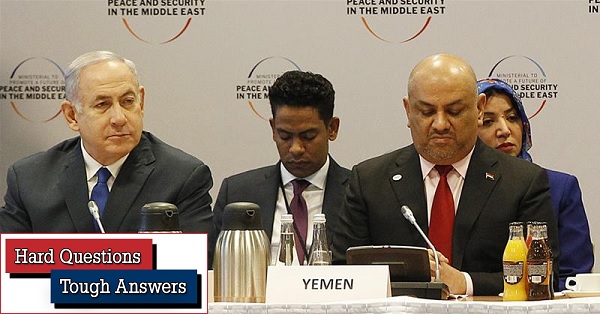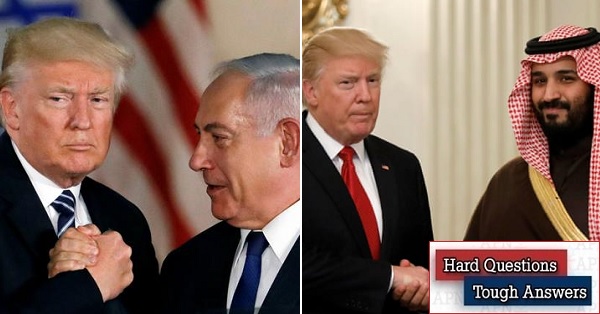Yossi Alpher is an independent security analyst. He is the former director of the Jaffee Center for Strategic Studies at Tel Aviv University, a former senior official with the Mossad, and a former IDF intelligence officer. Views and positions expressed here are those of the writer, and do not necessarily represent APN's views and policy positions.
Q. Last week at the Warsaw Ministerial international convocation convened by the US, PM Netanyahu made two highly provocative statements. One was about war with Iran. The other about Polish involvement in the Holocaust. What was behind all this?
A. It’s election time in Israel. One of Netanyahu’s biggest electoral assets in the eyes of his loyal voters is his status as a kind of global statesman, a leader accepted by the world and one who can influence the world. When he poses for photo-ops with Arab Gulf leaders and states or implies that they and Israel are at war with Iran, he is sending a message to his electorate that only he, Netanyahu, can rally the region against Iran. He is also signaling that for Israel’s Arab neighbors, the “war” with Iran is more important than the Palestinian issue.
Q. Is there a war with Iran?
A. No. Apparently at one point during the Warsaw meeting Netanyahu used the word
milhama (war) instead of maaracha (campaign, as in military campaign, sometimes translated as
“war”) in talking from Warsaw to his Israeli voters about Iran. This was translated immediately from Hebrew into
English, Polish, Arabic, etc. The resulting confusion was laid to rest when the prime minister’s PR people argued
that he had been mistranslated and did not intend to imply that Israel and the Arabs are fighting a war with
Iran.
The gist of the matter, as Netanyahu undoubtedly told his Arab interlocutors privately in Warsaw, is that Israel is
locked in a “campaign between wars” in Syria and to some extent in Lebanon against Iran and its proxies, including
Hezbollah, and in Gaza with Hamas. This strategic concept was articulated during the course of the past four years
under recently-retired IDF chief of staff Gadi Eizenkot: Israel preemptively interdicts Iran’s force-building
efforts in Syria with air force and commando operations while avoiding acts that could escalate into war or overly
antagonize the Russians in Syria. In this way, Israel maintains a high degree of security yet without risking
deterioration into all-out warfare.
The Hebrew acronym mabal, short for maaracha ben milhamot or campaign between wars, has become a
commonplace designation for this thus-far successful strategy in recent years. Netanyahu, as commander in chief
during these years, can take some credit for managing the mabal, and his voter base back in Israel undoubtedly
enjoys the impression that he is basking in glory in the presence of the Saudis, Emiratis and others who are also
concerned about Iran.
Q. So where’s the rub?
A. Two “rubs” were evident on this score in and around Warsaw. One is that the Arab
states that share Israel’s concerns over Iran’s drive for regional hegemony do not want to be portrayed as if they
are at war with Iran. Indeed, while they may exchange intelligence with Israel concerning Iran, they are not
fighting or antagonizing Iran in Syria or anywhere else. The closest the Saudis and UAE are coming is their fight
with the Yemeni Houthis, who are armed and trained by Iran and Hezbollah. Even there they are using mercenaries
from as far afield as Sudan and even Colombia. And even there the Gulf Arabs’ campaign is a disastrous military and
humanitarian failure.
It’s hard to believe Netanyahu deludes himself that at some point in the future an effective Arab army of any sort
will fight alongside Israel against Iran. Indeed, the Saudis can be counted on only to fight to the last
Israeli.
Secondly, with the sole exception of Bahrain’s Foreign Minister Khaled bin Ahmed al-Khalifa (recorded saying off
the record that Iran is “the more toxic challenge”), the Arab leaders who came to Warsaw, while condemning Iran
alongside Netanyahu, do not openly and energetically endorse the notion propagated by the Israeli prime minister
that they will shunt the Palestinian issue to the back burner in order to cooperate strategically with Israel
against “toxic” Iran.
Thus Saudi former chief of intelligence Turki Al Faisal bluntly told an Israeli journalist: “From the Israeli point
of view, Mr. Netanyahu would like us to have a relationship, and then we can fix the Palestinian issue. From the
Saudi point of view, it’s the other way around.” And Egypt’s President a-Sisi, who pointedly did not come to Warsaw
last week, stated last week that “The failure to reach a final and fair solution to the Israeli-Palestinian
conflict is the central source of instability in the Middle East”.
For my money, Prince Turki and President a-Sisi are far more representative of Arab political thinking and
diplomatic maneuvering than Bahrain’s al-Khalifa.
Q. But can Israel convince the Arab world that its “campaign between wars” will somehow push Iran out of the Arab Middle East?
A. Israel cannot even convince itself. A few weeks ago, recently retired Israel Air Force commander Amir Eshel, the man most involved in prosecuting the Mabal in recent years, proclaimed at a public conference that while Israel can blunt Iran’s drive into Syria, it is incapable on its own of actually forcing Iran out. Then, last week General Amos Gilead, recently retired as director of policy and political-military affairs at the Israel Ministry of Defense, added that even Russia with its strategic presence in Syria is unable to remove the Iranians. Israel, noted Gilead, has succeeded militarily against Iran in Syria at the tactical and operational level but not at the strategic level of preventing Iran from setting up bases in Syria.
Q. Israel has a strategic dialogue with Russia regarding Iran and Syria--something the US, which is withdrawing militarily, does not appear to have. . .
A. The US-Russian disconnect over Syria and Iran was brought home painfully last week.
While the US convened its sterile “Ministerial” in Warsaw primarily to discuss Iran, the Russians, Turks and
Iranians held one of their frequent summit meetings at Sochi on the Black Sea to discuss what is in effect their
division of labor in occupying Syria. For anyone really concerned about Iran, Sochi is where the action was last
week.
True, Russia and Iran still cannot agree with Turkey about security in northern Syria on the Turkish border. But
compared to US and western lack of a viable Syria strategy, they are in good shape.
Q. Now that we’re at the global level, what was Netanyahu’s second controversial statement in Warsaw last week, the one about Poland and the Holocaust, and what were the ramifications?
A. An Haaretz journalist accompanying him to Warsaw asked Netanyahu about the new Polish
law incriminating anyone arguing that the Polish people bear responsibility for the Holocaust. Netanyahu replied
that Poles did indeed collaborate with the Nazis. Here too, clumsy translations by Netanyahu’s entourage and by
Israeli journalists added to inevitable Polish umbrage. Warsaw’s protest took the form of the Polish prime
minister, Mateusz Morawiecki, cancelling his participation in a Visegrad summit being held in Israel this Monday
and Tuesday.
That means that, as with the Warsaw exchanges regarding Iran between Israel and the Arabs, there are two issues
here. One is Poland and the Holocaust. The other is the rather unusual fact that Israel is hosting a summit meeting
of leaders from Poland, Hungary, the Czech Republic and Slovakia who usually hold their periodic confabs in one of
their own capitals.
Q. These are four Central European Union countries with right-wing governments, at least two of which, Poland and Hungary, are going to great lengths to obfuscate their own WWII record of collaboration with the Nazis in murdering Jews. What is Netanyahu’s business with them?
A. Not only does Netanyahu, like the four Visegrad leaders and like presidents Putin of
Russia, Bolsonaro of Brazil and Trump of the US, belong to a growing club of world leaders with authoritarian
aspirations and anti-human rights records. In the case of Visegrad, Netanyahu cultivates European leaders whom he
hopes he can depend on to prevent European Union consensus against Israel on the Palestinian issue. To a shameful
degree, this leads him to look the other way at manifestations of anti-Semitism and Holocaust-whitewashing in
Poland and Hungary.
At the same time, for obvious reasons Netanyahu’s constituents back home are sensitive to Holocaust-related issues
and manifestations of anti-Semitism in Europe. He is frequently reminded that his two principal challengers in
Israel’s elections, Benny Gantz of Israel Resilience and Yair Lapid of Yesh Atid, are sons of Holocaust survivors.
That explains his lame attempt in Warsaw (backed up back home in Israel by anti-Polish rhetoric from
newly-appointed acting Foreign Minister Yisrael Katz) to get away with accusing the Poles in Hebrew of abetting the
Holocaust while obfuscating the statement in English. Still, at a cost of losing Morawiecki’s presence for the
Visegrad meeting in Jerusalem this week, Netanyahu’s Poland-Holocaust trade-off was a bargain.
Q. Apropos Israeli election calculations, no update this week?
A. At this moment in time, it is difficult to offer anything concrete. Final party rosters have to be filed by the end of this week. Only then will we know who is merging with whom (Lapid with Gantz? Labor with Meretz? Neo-fascist racists like Baruch Marzel and Eli Yishai with one another?) and who (almost certainly Tzipi Livni) is dropping out of the race for lack of a list strong enough to pass the four-mandate threshold. Only then will the really nasty election campaigning begin . . .


